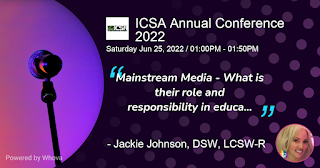ICSA Annual Conference: Mainstream Media – What is their role and responsibility in educating the public about cults?
Jackie Johnson, DSW, LCSW-R; Saturday, June 25, 2022; 1:00 PM-1:50 PM – online
This talk explores the role of mainstream media in providing public education about the dangers and dynamics of cults. Very often we notice mainstream media focusing on exposing specific corruptions or injustices from cultic groups, or highlighting sensationalized anecdotal situations or personal stories from former cult members. However, can mainstream media do more in terms of providing education about the hallmarks or characteristics of cultic or coercive groups beyond sensationalized stories?
How can the media expand its role in participating in meaningful cult education as a matter of public safety?
Jackie Johnson, DSW, LCSW-R, is a licensed clinical social worker with a certification in forensic social work. She obtained her master’s degree from Columbia University and her doctoral degree from the University of Tennessee. Dr. Johnson is a SGA survivor, having spent 43 years with Jehovah’s Witnesses. In her private practice, Dr. Johnson focuses on assisting indoctrinated individuals find freedom from cultic and other high-demand groups and process the trauma they experienced while being involved in systems of control or coercive groups and relationships. Her research interests include the epistemology of women and how cultic, coercive, and misogynistic experiences influence the cognitive development of women. Dr. Johnson can be reached at drjackie@drjacquelinejohnson.com. You can learn more about Dr. Johnson at her website, www.drjacquelinejohnson.com.



